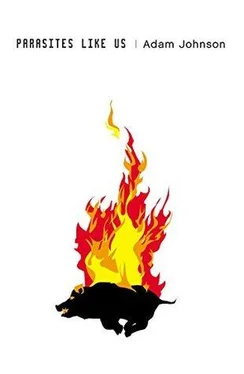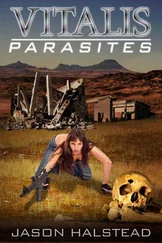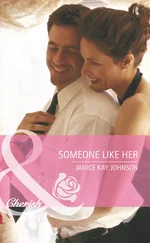“Eggers used leaves for a while, and I’m sure there’ll be a chapter in his dissertation about the poison-oak incident. Now I believe he’s winging it.”
A waiter in a red jacket beckoned us, and I could see that atop a freshly linened table sat a pair of steaming porterhouses. The steaks had come so fast, they must have been cooked for other people, who would now have to wait longer.
“How much did you tip these guys?”
My father shrugged and began to make his way through the tables, drink high. As I followed, it became clear to me that most of the customers were farmers and ranchers from smaller towns, like Doltin and Willis, people who made the trip in for Glacier Days and were now having a late lunch at the one nice place in town.
My steak was closer to medium, but cooked to perfection, from marbled beef that was probably slaughtered that morning at Hormel. The veins of fat had melted away, and I alternated the meat’s flaky butteriness with shocks of warming gin. For a while, the two of us simply ate, and every few bites I had to lean back against the red, rolled leather of the booth to remind myself I was alive. In those moments, with my head near the wall, I could make out the faint pop-pop of people firing their pistols in the converted movie house next door. The sounds were no more disconcerting than the faint screaming you’d once hear if you ate during the horror matinee, so my digestion was unaffected. I’d never heard a gun fired in anger, let alone fear, and I had no way of knowing then that before that winter was out, an evening would come when all the people in our great nation would fire their weapons at once.
Finally, I set my fork aside. I hadn’t even touched the carrots, let alone the hot rolls, but my father lifted his bone with two hands. “So what do students have to do for this fellowship money?” he asked, and raked his bottom teeth along the underside of the bone.
“Nothing, really. It supports them while they study or research. They just keep doing what they’re doing. But this money is going to make a big difference to Trudy. She’s studying Paleolithic art. The Clovis is the only known culture in the world that left no art behind. There are just a lot of points and blades. Trudy believes that weapons were their art. It’s a whopper of an idea. She’s maybe going too far with her feminist angle, but the premise is sound.”
“Are you sleeping with her?”
I tossed my napkin on the table.
“Really, Dad. You didn’t just say that. This fellowship you’re endowing is going to make all the difference for her. She has to travel to the cave dwellings in New Mexico, see the petroglyphs in Arizona. She needs to do comparative blade analysis all over North America, France, and of course Peru.”
“Hell, I could use a trip to France.”
“Bon voyage,” I told him.
Two waiters walked by, carrying a single tray between them. On it was a cut of meat called “The Cattleman.” There was no shortage of pomp in its delivery, yet the steak was the real deal — beyond large, it was the size of a saddle. If you could eat it, it was free, and the steak’s new owner seemed embarrassed only by the fact that this indulgence was a public event.
“What’s she like?” my father asked.
“Trudy? She’s pretty dang smart, for starters.”
“What’s she look like?”
“Physically?”
“Yes, physically.”
I had no desire to explain Trudy to my father. Her application for the Peabody Fellowship had given me her racial breakdown: a mix of African, French, Korean, and Japanese. With her height, her close-cropped hair, and those shoulders, I occasionally imagined her as a prototypical Clovis woman. It was an inappropriate fantasy, I knew. Scientifically, it was flawed as well — real Clovis were certainly smaller, more compact, and probably poorly nourished. Yet I couldn’t help, at times, imagining her body in motion as she hunted down a giant Pleistocene glyptodont.
“She’s big, Dad. Five foot nine, probably a hundred eighty pounds.”
He worked the last bit off the bone, so all that was left was the white vertebral shank and the descending postilum.
“Big num-nums?”
I shook my head no.
“So this girl,” Dad says, “if she’s so needy, how come she can’t even show up for a free steak?”
“I think she’s a little mad at me right now.”
“You are sleeping with her.”
“No, no, she has a fellowship, the Peabody, but the school’s taking it away and giving it to the caveman. It’s just miscommunication. She doesn’t know about your fellowship yet, the Hannah.”
My father pointed the steak shank at his own chest.
“Well, what do I get out of this fellowship-donor thing?”
“Immortality, Dad. Your name gets to live forever.”
I expected him to laugh or smart-ass, but he said nothing, just set aside the bone and reclined, hands on chest, against the plush leather. He ran his tongue along his teeth, then asked, “You ever met anyone who really wanted to live forever, one person who just wanted to keep going and going?”
I shrugged. “I suppose not.”
Dad leaned forward. “Then no fucking plaques of me when I’m dead, okay?”
* * *
When the moon looked high in the sky, I set out from my little apartment by the river, and made my way to Trudy’s. She lived alone in a small graduate dorm by the cafeteria, and you could still catch a scent of fried egg rolls in the air from the meal plan earlier that night. It began to snow as I walked, so softly at first that I couldn’t tell for sure when the flakes started coming down, but by the time I stood in her courtyard, there were yellow curtains of snow hanging under the campus floodlights.
When I knocked, the flimsy dorm walls shook, rattling the neighbors’ windows, and the sound off the hollow-core door was loud enough that three other students stuck their heads out to see if it was for them. But Trudy didn’t answer.
“Trudy?” I called.
“Go away, Dr. Hannah.”
“Please listen to me, Trudy. I know you’re upset that the university took your fellowship away, but we have a better fellowship for you.”
Inside, I could hear her pour a glass of water.
I spoke into the peephole: “If you could just listen to what I have to say.”
“There’s a fellowship in Arizona I could apply for,” I heard her say. “And that postdoc at Stanford, unless Eggers already has it spoken for. I was dragged all over the world my entire childhood. No need to put down roots here, I guess.”
My voice raised in pitch as I tried to reassure her. I even took out my inhaler, just in case I needed it. “Everything’s going to be okay, Trudy. This is a better fellowship. You’ll like it much better.”
“Don’t tell me ‘everything’s going to be okay,’” Trudy said. “Don’t tell me what I’ll like and not like. I want my Peabody back. That’s the fellowship I earned.”
“You’ll be the first recipient of this new fellowship. My father has established the Hannah Fellowship, in my stepmother’s name, and after careful consideration, you’ve been chosen as the first recipient.”
Trudy opened the door, her hand holding a tumbler of water, half full. She wore her usual paint-speckled jeans, a sweater of chocolate wool a shade darker than her skin, and she’d had her hair cut even shorter since I’d seen her last. My God, those cheekbones. I stole a quick puff off my inhaler.
“I’m the one who should be knocking on your door late at night, telling you how I feel,” she said. From behind her came a tide of warm air, smelling faintly of turpentine.
“Okay,” I said. “How do you feel?”
Trudy shifted in the doorway. She took a drink of water. I could see she’d been repainting the walls of her dorm room with ancient cave drawings and symbols.
Читать дальше












